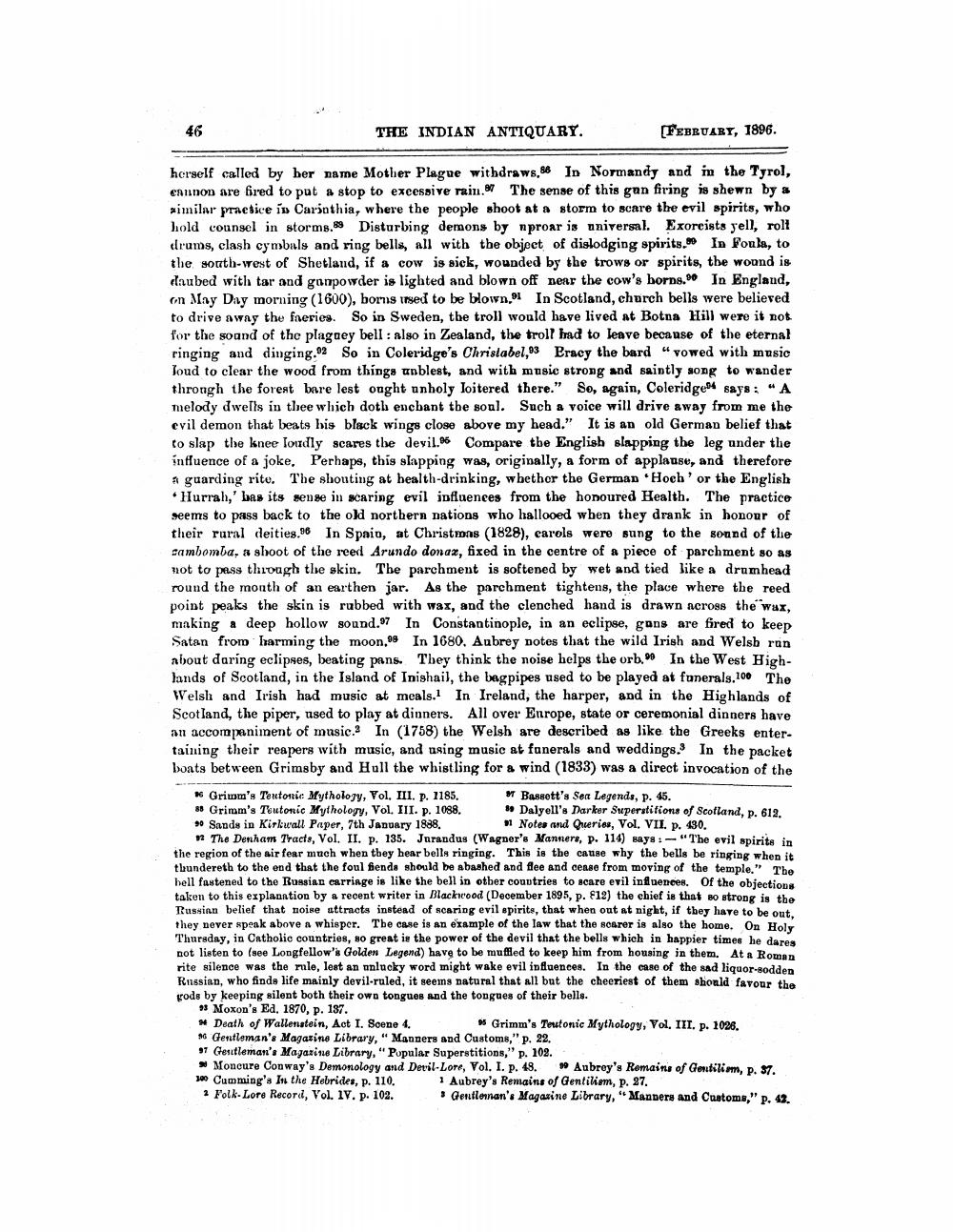________________
46
THE INDIAN ANTIQUARY.
FEBRUARY, 1896.
herself called by her name Mother Plague withdraws.86 In Normandy and in the Tyrol, ennnon are fired to put a stop to excessive rain. The sense of this gan firing is shewn by a similar practice in Carinthia, where the people shoot at a storm to scare the evil spirits, who hold counsel in storms. Disturbing demons by nproar is universal. Exorcists yell, roll drums, clash cymbals and ring bells, all with the object of dislodging spirits. In Poula, to the south-west of Shetland, if a cow is sick, wounded by the trows or spirits, the wound is daubed with tar and ganpowder is lighted and blown off near the cow's borns. In England, on May Day morning (1600), borns itsed to be blown. In Scotland, church bells were believed to drive away the fneries. So in Sweden, the troll would have lived at Botna Hill were it not for the soand of the plagaey bell : also in Zealand, the troll irad to leave because of the eternal ringing and dinging.o2 So in Coleridge's Christabel,03 Eracy the bard “vowed with music Joud to clear the wood from things unblest, and with music strong and saintly song to wander through the forest bare lest onght anholy loitered there." So, again, Coleridge says: "A melody dwells in tliee which doth encbant the soul. Such a voice will drive away from me the evil demon that beats his black wings close above my head." It is an old German belief that to slap the knee loudly scares the devil. Compare the English slapping the leg under the influence of a joke. Perhaps, this slapping was, originally, a form of applause, and therefore a guarding rite. The shouting at health-drinking, whether the German 'Hoeh'or the English • Hurrah,' bas its sense in scaring evil influences from the honoured Health. The practice seems to pass back to the old northern nations who hallooed when they drank in honour of their rural deities.96 In Spain, at Christmas (1828), carols were sung to the sound of the cambomba, a shoot of the reed Arundo donax, fixed in the centre of a piece of parchment so as not to pass through the skin. The parchment is softened by wet and tied like a drumhead round the month of an earthen jar. As the parchment tightens, the place where the reed point peaks the skin is rubbed with wax, and the clenched hand is drawn across the wax, making a deep hollow sound.97 In Constantinople, in an eclipse, gans are fired to keep Satan from harming the moon. In 1680. Aubrey notes that the wild Irish and Welsh run about daring eclipses, beating pans. They think the noise helps the orb. In the West Highlands of Scotland, in the Island of Inishail, the bagpipes used to be played at funerals.100 The Welsh and Irish had music at meals. In Ireland, the harper, and in the Highlands of Scotland, the piper, used to play at dinners. All over Enrope, state or ceremonial dinners have an accompaniment of music.? In (1758) the Welsh are described as like the Greeks entertaining their reapers with music, and using music at fanerals and weddings. In the packet boats between Grimsby and Hull the whistling for a wind (1833) was a direct invocation of the
* Grimm's Teutonic Mythology, Vol. III. p. 1185. * Bassett's Sea Legends, p. 45. 8 Grimm's Teutonic Mythology, Vol. III. p. 1088. * Dalyell's Darker Superstitions of Scotland, p. 612. 90 Sands in Kirkwall Paper, 7th January 1888.
Notes and Queries, Vol. VII. p. 130. n The Denham Tracts, Vol. II. p. 135. Jurandus (Wagner's Manners, p. 114) says : -"The evil spirits in the region of the air fear much when they hear bells ringing. This is the cause why the bells be ringing when it thundereth to the end that the foul fiends should be abashed and flee and cense from moving of the temple." The hell fastened to the Russian carriage is like the bell in other countries to scare evil influences. Of the objections taken to this explanntion by a recent writer in Blackrood (December 1895, p. 812) the chief is that so strong is the Tussinn belief that noise attracts instead of scaring evil spirits, that when out at night, if they have to be out. they never speak above a whisper. The case is an example of the law that the soarer is also the home. On Holy Thursday, in Catholic countries, so great is the power of the devil that the bells which in happier times he dares not listen to (nee Longfellow's Golden Legend) have to be muffled to keep him from housing in them. At a Roman rite silence was the rule, lost an unlucky word might wake evil influences. In the case of the sad liquor-sodden Russian, who finds life mainly devil-ruled, it seems natural that all but the cheeriest of them should favour the Kods by keeping silent both their own tongues and the tongues of their bells.
93 Moxon's Ed. 1870, p. 137. * Death of Wallenstein, Act I, Scene 4.
» Grimm's Teutonic Mythology, Vol. III. p. 1026. no Gentleman's Magazine Library, "Manners and Customs," p. 22. 97 Gentleman's Magazine Library, "Popular Superstitions," p. 102.» Moncure Conway's Demonology and Devil-Lore, Vol. I. p. 48. 19 Aubrey's Romains of Gentilim, p. 37. 30 Cumming's In the Hebrides, p. 110. Aubrey's Remains of Gentiliem, p. 27.
Folk Lore Recordi, Vol. iv. p. 102. Gentlenan's Magazine Library, "Manders and Customs," p. 43.




